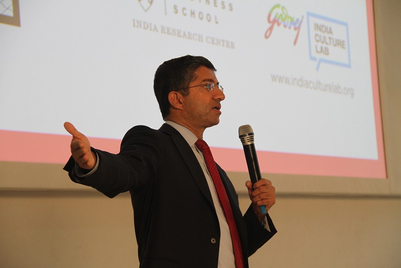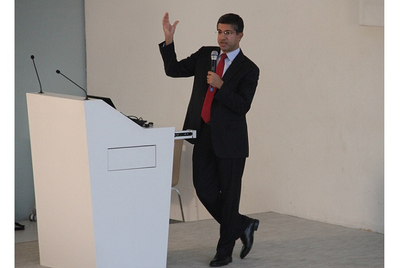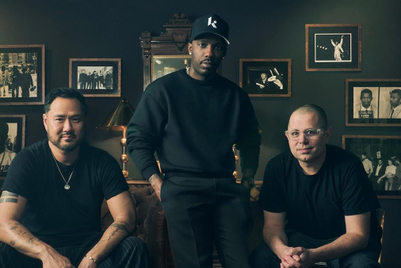
Mike Dodds, chief executive at Proximity London, outlines eight lessons learned from last year's185th Advanced Management Programme at Harvard Business School.
Last September, 162 global CEOs, CFOs and General Managers from 40 countries and 17 industry sectors, lived together, worked and drank from the HBS "fire hydrant" for eight intensive weeks.
The small British contingent of 12 included executives from international organisations like Tesco and BA, but the global nature of the programme and the material covered was a stark reminder of the global economy we are all operating in. We were taught by world class business professors and heard from Jeff Immelt (GE), Porter, Luca de Meo (VW) and Kotter along the way.
I was the sole representative from adland, following in the footsteps other agency alumni like Ian Pearman, Debbie Klein, Jonathan Mildenhall and Charles Garland. I returned inspired and energised, with a fresh perspective on my own business and a deeper understanding of the challenges and opportunities that my clients are and will be facing.
Here are eight nuggets that for me are of universal relevance as we face these challenges and opportunities together;
1 - What used to be motivating factors have become hygiene factors today
Companies forget this and bake "hygiene" factors into their operating structures at great cost and little benefit. There’s no client company, or agency for that matter, that cannot profit from asking itself which elements of its customer proposition have become "hygiene".
It’s also a reminder that organisations need to ensure that their "delivery muscle" doesn’t outweigh their "discovery muscle" as product and service innovation will continue to drive competitive advantage.
2 - Mediocre strategy and excellent execution will always beat excellent strategy and mediocre execution
Always! A surprising statement from a business school with such a rich strategic provenance. However we were reminded that strategy "isn’t just about thinking, it’s about setting an agenda and building and organisation or a system to deliver it". Success rarely relies on one delivery advantage – it’s a whole system and how it inter-relates.
3 - Simplicity is the highest form of sophistication
This quote is attributed to Steve Jobs however the theme was one that most of the visiting global business leaders spoke about and coveted as a driver of success in today’s increasingly complex world.
Sir Terry Leahy lead with the "Tesco Way" in the 90s and one of his team summed up the challenge at the time by saying "there was a clear message that bright people weren’t supposed to use their intellect to make things more complicated but to make things simpler".
4 - What is the parenting advantage?
This recognises that a company’s assets are its employees plus the assets the company provides those employees (reputation, brand, systems, culture, process etc) to do their job better than they could do elsewhere.
In a world where employees have been increasingly under the performance spotlight this concept neatly turns that spotlight back on the company’s contribution to success.
The concept also holds true for any organisation that’s part of a corporate structure or Group. What assets are the corporate parent providing that allow its operating units to perform better within that Group as opposed to outside it? And are those assets worth the "corporate overhead"!
5 - Big data equals small effects
We reflected on the fact that as the data haystack continues to grow it becomes increasingly difficult to find the needles or behavioural nuggets within it.
Typically big data allows us to deliver a deep and powerful customer experience at an individual level. The question is whether this can be delivered with enough individuals to generate sufficient value.
In other words the experience might be deep but the overall impact or value creation might be small. This is the challenge for brands contemplating significant "big data" investments.
6 - Make problems visible
In studying the famous "Toyota Production System" (TPS) we were reminded that western business culture typically focuses on talking up successes and burying failure, whereas the Japanese way is to bring failure to the attention of senior management quickly and to even study successful projects to see how they could be improved.
The trick is to develop a process and more importantly a culture where intelligent failure is encouraged and problems are seen as opportunities for continuous improvement.
7 - Feedback is the breakfast of champions
Numerous case studies demonstrated that not giving individual feedback is not just lazy, it’s cruel! Indeed even when we do give feedback psychologists have proven that we all think "we are much more transparent than is actually the case".
So it’s not just about giving feedback (good and bad) it’s about being clear and explicit. Feedback works both ways and finding a secure environment to receive upward feedback is also vital. The US Marines call this "talking truth to power" and it’s an important component of their culture.
8 - Leading versus lag indicators
The GFC (Global Financial Crisis) produced an understandable fixation with financial results. However financials are a result of "what you do" and are "lag" rather than "leading" indicators of performance.
A leading indicator in my business would probably be the number of times the agency cracks a campaign idea and gets it approved first time round. This would have a disproportionate impact on my agencies financial (and creative) performance so I need to start measuring it.
Retailers and retail analysts know that when "inventories grow faster than sales, it’s a red flag". That’s their leading indicator. The question is what are the leading indicators in your business?
(The article first appeared on www.marketingmagazine.co.uk)


.jpg&h=334&w=500&q=100&v=20250320&c=1)
.jpg&h=334&w=500&q=100&v=20250320&c=1)

.jpg&h=334&w=500&q=100&v=20250320&c=1)


.jpg&h=334&w=500&q=100&v=20250320&c=1)
.jpg&h=334&w=500&q=100&v=20250320&c=1)






.png&h=268&w=401&q=100&v=20250320&c=1)

.jpg&h=268&w=401&q=100&v=20250320&c=1)

